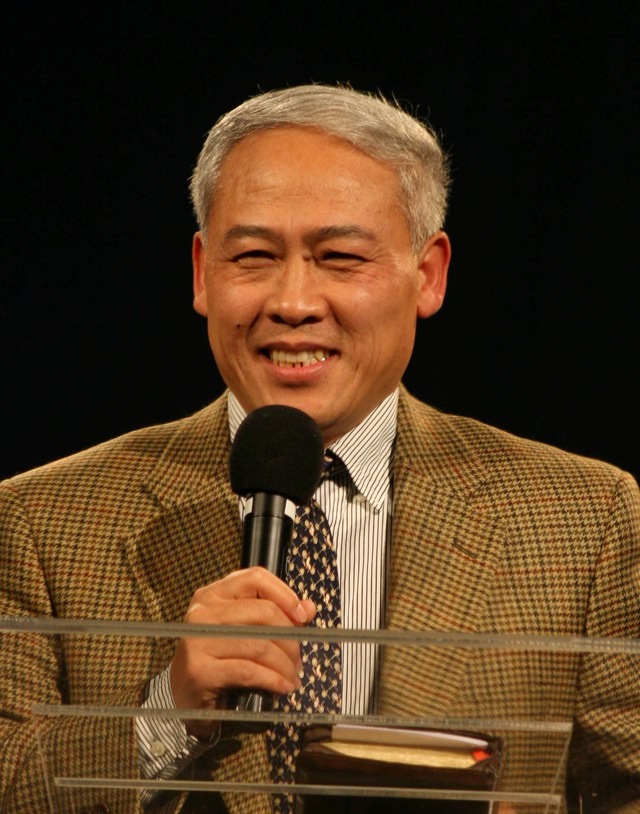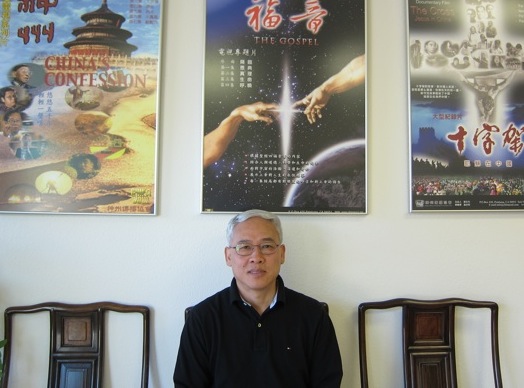In the intellectual ferment leading up to the 1989 Tiananmen protests, a much-watched series on Chinese television called River Elegy became closely identified with the hopes of China’s reformers. The six-part series, which used the Yellow River as an allegory for Chinese civilization, argued that China should move away from its inward-looking culture, symbolized by the muddy river, and embrace the deep blue oceans that link China to the outside world. One of the series’ writers was a graduate student of Marxism at Renmin University named Yuan Zhiming.
After the Tiananmen crackdown, Yuan became one of the country’s most-wanted dissidents, fleeing to Paris and eventually making his way to Princeton. It was there, in 1992, that he converted to Christianity and later started his US-based charity, China Soul for Christ Foundation. Although banned from entering China, he has become one of the country’s most influential spiritual figures through his documentaries and videotaped sermons. This summer, I met Yuan at his offices north of San Francisco, where we talked about China’s moral crisis, the future of communism, and the problems Christianity has in adapting to its new home.
Ian Johnson: The Chinese government seems to recognize that there is a crisis of faith. How do you see its efforts to promote public morality?
Yuan Zhiming: Everyone sees the crisis clearly. Everyone knows it. What China lacks the most is faith or a spiritual support. Look at [the disgraced Chinese political leader] Bo Xilai. He tried to use Mao’s idea to create a spiritual support for people in Chongqing [the city-state of 30 million that he headed] by having them sing old communist songs. He recognized that people lacked a sense of community and wanted to create a model in Chongqing for all of China. But he made a mistake in that Mao isn’t a God. This is again the Chinese problem of worshipping humans.
What do you mean?
For example, worshipping Mao Zedong. I studied Mao’s works quite a bit. One of the things he taught was hatred: The first sentence in the first essay in the first volume of his collected works is “Who are our enemies? Who are our friends? This is a question of the first importance for the revolution.” This is the mentality of most Chinese. You can see this in China’s foreign policy. If you’re their enemy, even if you help them they’ll accept the aid but they won’t change their view that you’re their enemy. They don’t have the idea of yi (righteousness). Just li (benefit).
Chinese never relax with foreigners. This is what Mao taught us. From the time we were young we learned this. When I was small we’d watch movies, and when the movie would start I’d ask my mother and father who’s the good guy and who’s the bad guy, because it had to be divided into that sort of binary relationship. And the bad people, everything about them was bad. Every feeling was dirty. They looked ugly.
This [way of seeing things] includes contemporary directors, like Zhang Yimou. He made a film last year called The Flowers of War about the Nanjing massacre. He was up for an Oscar but didn’t get one. I think one reason is that he had Mao’s value system internalized. The Japanese are the bad guys, of course, but in his portrayal the Japanese troops from A to Z are bad. They don’t have any humanity in them at all. Bad people can’t be 100 percent bad and good people can’t be 100 percent good. But that’s how Chinese see the world.
But even in the case of Mao, the Communist Party itself said that he was 70 percent good and 30 percent bad. That’s a differentiated view.
Yes, that’s how Deng tried to make it: the official verdict was Mao’s accomplishments were 70 percent good and 30 percent bad. But you know how most Chinese see it? 70 percent think he’s 100 percent good and 30 percent think he’s 100 percent bad! [laughs]
Is this us-them relationship reflected in the system of guanxi—connections—between people?
Yes, if you’re my friend, you’re great and perfect. The point isn’t, “Is the person good or bad?” Instead, it’s “Are you good to me or not?” This is a terrible thing. There’s a saying in China: Where you sit determines how you think. If you’re sitting next to me, you’re on my side no matter what you do. If you’re sitting on the other side, no matter what you do, it is bad. That’s why they don’t believe in win-win.
What about the traditional Chinese concept of tian —heaven, which dispenses justice—and quasi-mythical judges like Lord Bao who enforced justice on earth?
Advertisement
But look at traditional Chinese novels. Look at The Water Margin. That story is really telling. People are killing and killing and they can be bandits and robbing but if they come to your side, then they are your brothers. [The outlaw hero] Song Jiang is like that. He’s a bandit but when he comes over, he’s a brother.
How did you go from making River Elegy, a critical documentary about Chinese society and politics, to Christianity?
River Elegy’s conclusion was that the solution for China was democracy and human rights. But it was only when I got to the West that I realized that the root of this was Christianity. It was the Bible. It creates something more important than rights given by a constitution or a government. It creates God-given rights—endowed by our creator. This made rights something permanent and not dependent on a leader.
Some Chinese Christians go further and reject much of traditional Chinese culture, saying it is incompatible with democracy and Christianity.
A lot of Chinese Christians seem to know more about Israel’s history, through the Old Testament, than they do about the 5,000 years of Chinese culture. I find this unreasonable. People say there was no revelation of God in China but I felt this was wrong. So I was trying [in the DVD series China’s Confession ] to find the hand of God in China, his footprint. How could there not be God’s footprint? You can’t say “Jesus has arrived, let’s execute Confucius and Laozi!” Instead, we have to think that they would have welcomed Jesus. They weren’t prophets but they were seekers too.
You also tried to show that Christianity is at home in China by making The Cross, a documentary on Christianity’s surprisingly long history in China. How did you decide to start making films again?
People said, “River Elegy was so popular, why don’t you try to use broadcast media for God too?” So that was the origins of the series. And then my wife told me, “You go out and preach all the time. Why don’t you record them as well?” So we got professional microphones and cameras and recorded some of my sermons and then those of other pastors. That series is really popular in mainland China. People were circulating pirated copies all the time. Some said they were copied so much that the image was lost and all you could get was the sound but they said they were happy—they really wanted to hear the message.
This is a gift of God: the fact that Chinese have no sense of copyright! People say, “Do you copyright it?,” and I say, “No, no copyright.” In fact, if anyone is going to the mainland for business or tourism or to visit friends, if they’re willing to take the DVD in we give it to them for free—we’ll even send it to them for free. We just have a request: if it’s for your own purpose please buy it. We’ve sent in about 500,000 DVDs that way. We’ve spent over $1 million on this. It’s on purpose, of course, because we’re a charity. We never lack money though. We have generous donors who are happy to support this work.
How has Christianity changed since you started preaching to Chinese?
There are far more Christians now than in the 1990s. But it was more fervent back then. After the Cultural Revolution people were free and excited and could do what they wanted. Now people are faced with the problems we face here in the US. Secularization is a lure for people. They want to make money.
Another change is that it’s spread from the lower classes to the upper classes. In the past it was mainly just peasants. They had a tough life. People looked down on them. So Jesus’s message appealed to them. Now, the upper classes in the city feel the spiritual vacuum. So now you see a lot more people in the world of arts and thought who are attracted. This means the intellectual level of Christianity is much higher. When we filmed The Cross there weren’t people like Jin Tianming [the intellectual pastor of the banned Shouwang Church]. I interviewed [the exiled writer] Yu Jie for the film but he wasn’t a Christian yet. But all these people have emerged.
I noticed that the pastors you chose to record for the series of sermons are all from the mainland. Why not from other parts of the Chinese-speaking world?
Advertisement
Most people on the mainland who are interested in Christianity don’t understand a lot of the vocabulary that others might use. They don’t get the Trinity or things like that. But I was an atheist for thirty-six years. I can use stories and reference points that non-believers can understand—when I talk about family life and how I used to fight with my wife. Or I talk about [the Communist hero] Lei Feng or make movie references. But maybe more important is the value system. I can say “I was like that in the past,” and they say, “Yes, that’s what I’m like now.”
The communists know there is this crisis, but they don’t want Christianity. They promote Buddhism or Daoism over Christianity, or they advocate Confucianism.
Why?
Because it’s Chinese. Mao is Chinese. Laozi is Chinese. Confucius is Chinese. Buddhism has been in China for a long time, so it’s treated as indigenous. But Jesus is universal. It’s being part of the whole world. This is a threat to the Party, because it wants to use nationalism to rule. Christians can’t believe in a Mao because they have a true God. If just 25 percent of Chinese became Christians, then China would be really different. The spirit of communism would be broken. It’s like a software program. If everyone uses the same software to think, they think alike.
The Communist Party has its software too.
Yes, definitely. They make everyone use it, from elementary school onwards. Every child learns it, so it’s hard to change. But we have to do this. We need to change this nationalistic patriotism, and change it to Christianity. But this change will be peaceful and soft. The Communist Party shouldn’t worry. It won’t be violent. It’s better than the Party being thrown out of power or collapsing.
This is part of Ian Johnson’s continuing series of interviews with Chinese writers and thinkers. He previously spoke to writer Yu Jie about his new Liu Xiaobo biography; exiled legal activist Chen Guangcheng about China’s urban-rural divide; and former senior official Bao Tong about political corruption in Beijing.



